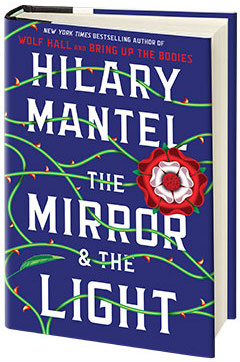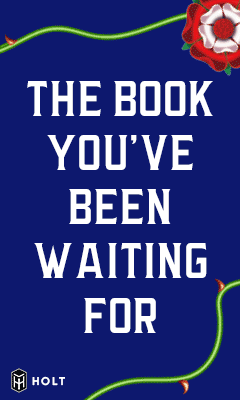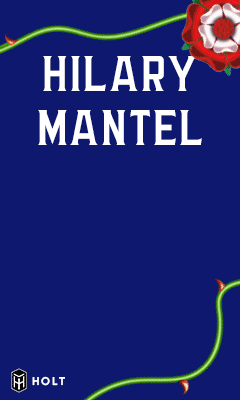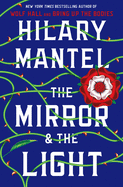The Mirror & the Light
by Hilary Mantel
The Mirror & the Light is the long-awaited conclusion to Hilary Mantel's magnum opus, a trilogy of historical novels begun with Wolf Hall (2009) and Bring Up the Bodies (2012) The Mirror & the Light manages the daunting task of providing a satisfying, if deeply melancholy, account of real-life protagonist Thomas Cromwell's final years in the court of King Henry VIII. Over the course of three sizable books (this one weighs in at almost 800 pages), Mantel has established one of the largest and most memorable cast of characters outside of a fantasy epic like Game of Thrones. Even deceased characters like Cardinal Wolsey and the executed Anne Boleyn loom large in Cromwell's memory, as the many deaths Cromwell has seen or played a part in increasingly intrude on his thoughts. The Cromwell of The Mirror & the Light is older and more tired; of the trilogy, this book is consequently the most concerned with mortality. It's as stuffed with political machinations as the first two, but it seems ever more meditative and death-haunted as Cromwell approaches his inevitable end.
The Mirror & the Light includes many interesting characters, but, as ever, Mantel's protagonist is the most compelling; here, she solidifies her Cromwell's place as one of the most richly drawn characters in modern literature. Cromwell's sometimes ruthless pragmatism continues to be a fascinating lens through which to view the tumultuous events of King Henry VIII's reign. The novel begins immediately after the execution of Anne Boleyn (which concluded the previous book) with Cromwell's deadpan reaction: "Once the queen's head is severed, he walks away. A sharp pang of appetite reminds him that it is time for a second breakfast, or perhaps an early dinner. The morning's circumstances are new and there are no rules to guide us." In the aftermath of Boleyn's death and Jane Seymour's ascendance, Cromwell's power approaches its apex. Seymour says: "Lord Cromwell is the government, and the church as well." Despite Cromwell's title and increasing wealth, he is ever aware of how close to the precipice he remains in a court dominated by shifting alliances, foreign intrigues and the unpredictable whims of the king.
A conflict dominates the early part of the novel, reminiscent of that between Cromwell and Thomas More at the end of Wolf Hall. This time, it concerns Mary, the product of the king's marriage to Katherine of Aragon, now declared invalid. Cromwell must convince Mary to accept the king's judgment regarding her exclusion from the line of succession. Yet again, it is a battle between unbending principle and Cromwell's utilitarianism. Despite his ruthless reputation, Cromwell risks his own position in convincing Mary to accede, thereby saving her life and upholding a promise he made to Katherine. When he is questioned about his choice, he thinks: "That's the point of a promise.... It wouldn't have any value, if you could see what it would cost you when you made it." Cromwell is such a fascinating, complicated character because, for all his hard-nosed realism, he works hard to save those he can.
The controversies and emergencies that occupy Cromwell over the course of the book come one after another, and they are so engrossing that readers may forget that Cromwell must eventually arrive at his grim, historically determined fate. He buries himself in work and, like Cromwell, the book is perfectly happy to luxuriate in the details. We follow Cromwell as he dissolves monasteries; writes letter after letter; attempts to end the exploitation of holy relics; designs and builds; tries to pass legislation to help the poor; and much more. Mantel creates a phenomenal time machine that makes arguments about theology and government seem as radical and urgent as they must have felt at the time.
Even as Mantel's England charges into a new era, though, the past asserts itself: "A prince cannot be impeded by temporal distinctions: past, present, future. Nor can he excuse the past, for being over and done... the past is always trickling under the soil, a slow leak you can't trace. Often, meaning is only revealed retrospectively." As the plot hurtles forward, Cromwell increasingly looks to the past, reflecting on his childhood and his long, bloody journey from a commoner living under the thumb of his violent father to the most powerful minister in England. Though Cromwell cannot predict that his downfall is coming, the final volume nevertheless communicates an elegiac mood. It is here that the ornate writing is at its most beautiful:
"Don't look back, he had told the king; yet he too is guilty of retrospection as the light fades.... You look back into your past and say, is this story mine; this land?... Is this my life, or my neighbour's conflated with mine, or a life I have dreamed and prayed for; is this my essence, twisting into a taper's flame, or have I slipped the limits of myself--slipped into eternity, like honey from a spoon?"
Mantel's avid fans will find the ambition and skill brought to bear in this final volume astounding. King Henry VIII and his court have been much written about, yet Mantel's interpretation is distinct in a thousand ways. Cromwell is an unforgettable character, and some readers might find it bittersweet to reach the final pages of his story. As with the best novels, The Mirror & the Light leaves behind the complicated, sad-happy feeling of coming to the end of a treasured experience. --Hank Stephenson








